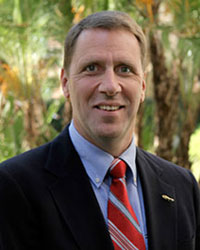
Karl Havens, Florida Sea Grant Director
Florida Sea Grant director Karl Havens has been confirmed as a member of a National Academy of Sciences committee that evaluates progress on the Comprehensive Everglades Restoration Plan, the multibillion-dollar effort underway in south Florida to restore historic water flows to the Everglades.
As a member of the Committee on Independent Scientific Review of Everglades Restoration Progress, or CISRERP, Havens will join an ongoing panel of 13 other prominent scientists from across the U.S. tasked with monitoring progress toward Everglades restoration and assessing scientific or engineering issues that may hinder the effort.
The committee is organized within the National Research Council, the working arm of the congressionally chartered National Academy of Sciences. Committee members serve as individual experts on various aspects of the Everglades, not as representatives of organizations or interest groups. Havens’ appointment was approved by the president of the National Academy of Sciences, who is also the chair of the National Research Council.
Havens is a professor of aquatic ecology in the fisheries and aquatic sciences program at the University of Florida, and has been studying aquatic ecosystems for 34 years. He was named to the panel because of his expertise working with the greater Everglades ecosystem, in particular Lake Okeechobee. His research program that is focused on how natural and human stressors affect aquatic ecosystems. Before arriving at UF in 2004, he was the chief environmental scientist at the South Florida Water Management District.
The committee plans to meet next in late September in Miami, and Havens says he is excited to give input into a project considered crucial to the state of Florida.
”The Everglades is a precious and unique natural resource of the United States. It has been heavily impacted by human actions since before the 1950s and is suffering from a lack of clean water. At the same time, projects that took water away from the Everglades are polluting coastal estuaries with nutrient-laden runoff,” he said.
“The region needs a comprehensive restoration project that deals with these issues and also with the effects that climate change might have on outcomes of projects identified to address them. It is an honor to bring my own experiences and knowledge to bear with this outstanding committee in order to help guide the Everglades restoration program toward success.”
Additional committee members are:
- David B. Ashley, emeritus professor of Civil Engineering, University of Nevada
- Mary Jane Angelo, professor of law, Levin College of Law, University of Florida
- William G. Boggess, professor and associate dean, College of Agricultural Sciences, Oregon State University
- Charles T. Driscoll, professor, Department of Civil and Environmental Engineering, Syracuse University
- Siobhan Fennessy, associate professor of biology, co-director of Environmental Sciences, Kenyon College
- William L. Graf, distinguished professor emeritus, department of geography, University of South Carolina
- Wayne C. Huber, professor emeritus, Oregon State University
- Fernando R. Miralles-Wilhelm, executive director, Cooperative Institute for Climate and Satellites; professor, Department of Atmospheric and Oceanic Science, University of Maryland
- David H. Moreau, professor and chair, Curriculum for the Environment and Ecology, University of North Carolina
- Gordon H. Orians, professor emeritus, University of Washington
- Denise J. Reed, chief scientist, The Water Institute of the Gulf
- James E. Saiers, professor and associate dean, School of Forestry and Environmental Studies, Yale University
- Jeffrey R. Walters, Harold Bailey professor of biological sciences, Department of Biological Sciences, Virginia Tech
The CISRERP has published a review of Everglades restoration progress every two years since 1996. Copies of each review, as well as current committee member biographies can be found at this link: Independent Scientific Review of Everglades Restoration Progress Project Information.



